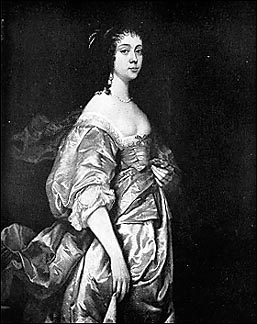
Margaret Cavendish (1623 – 1673) was an English aristocrat, prolific writer, outspoken critic, and proto-feminist. In her 1662 essay titled Female Orations she claims that men willingly delivered to women’s disposal their power, persons, and lives, enslaving themselves to women’s will and pleasures, while considering women as lofty saints whom they adored and worshipped. Margaret Cavendish asks, “what can we desire more than to be men’s tyrants, destinies, and goddesses? – PW
Noble ladies, honorable gentlewomen, and worthy female-commoners… why should we desire to be masculine, since our own sex and condition is far the better? For if men have more courage, they have more danger; and if men have more strength, they have more labor than women have; if men are more eloquent in speech, women are more harmonious in voice; if men be more active, women are more graceful; if men have more liberty, women have more safety; for we never fight duels nor battles; nor do we go long travels or dangerous voyages; we labor not in building nor digging in mines, quarries, or pits, for metal, stone, or coals; neither do we waste or shorten our lives with university or scholastical studies, questions, and disputes; we burn nor our faces with smiths’ forges or chemists furnaces; and hundreds of other actions which men are employed in; for they would not only fade the fresh beauty, spoil the lovely features, and decay the youth of women, causing them to appear old, when they are young; but would break their small limbs, and destroy their tender lives.
Wherefore women have no reason to complain against nature or the God of nature, for although the gifts are not the same as they have given to men, yet those gifts they have given to women are much better; for we women are much more favored by Nature than men, in giving us such beauties, features, shapes, graceful demeanor, and such insinuating and enticing attractiveness, that men are forced to admire us, love us, and be desirous of us; insomuch that rather than not have and enjoy us, they will deliver to our disposals their power, persons, and lives, enslaving themselves to our will and pleasures; also, we are their saints, whom they adore and worship; and what can we desire more than to be men’s tyrants, destinies, and goddesses?